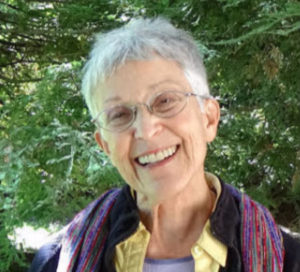Today, SevenPonds speaks with Judy Long, an educator and chaplain at UCSF Medical Center in San Francisco. In her role as a chaplain, she communicates with patients, families, caregivers, physicians and nurses to find the best possible care plan. Judy leads patients and their caregivers through guided meditations designed to ease suffering, and helps them find their own support system via spiritual practice, religion or other beliefs. As an educator, she trains caregivers and healthcare professionals on skills designed to assist patients. In the past, she has taught at public schools and community colleges, and she leads workshops at Stanford, UCSF and hospice facilities. She has a particular interest in helping caregivers retain their strength as they help others.

Credit: Judy Long
Marissa Abruzzini: Thank you for speaking with us today! What got you interested in becoming a chaplain?
Judy Long: I never thought I would become a chaplain, but caregiving was something that was part of my life early on. My father died when I was 13, and after that, my mother started working for hospitals, helping people with terminal illnesses. This was a normal thing that I witnessed throughout my life.
I was an educator for most of my life, but in my late 20s, I started doing a regular meditation practice. Then, I came back into that practice later in life, and it was sort of like coming home. I became interested in stress reduction techniques, and that led me to an introductory program for chaplaincy. After I finished the program, I did a residency at a teaching hospital, and I’ve been a chaplain ever since.
Marissa: What services do you offer your patients and their caregivers?
Judy: I think all of us give care. The patients focus on caring for themselves, the family and physicians focus on caring for the patient. My job is to figure out how we can get the best quality of life and coordinate this in a balanced way. Personally, I like to know what each area is doing. I like to communicate with nurses, physicians and families to enhance quality of life for the patient.
Specifically, I help patients discover, or rediscover, spirituality, and use this as a resource for healing. This looks different for each person. For example, someone with a strong religious background might need to reconnect with people in their faith community. I might ask whether they’re keeping in touch with that community. For someone who’s not religious, but spiritual, I might ask them what matters most to them in life and uncover the layers of their beliefs. I help them to see their own resources and find balance in the midst of suffering.
Marissa: How do you know which method to use?

Credit: Flickr.com
Judy: I keep a sense of curiosity. I try to have a listening presence, and I try not to assume or form ideas in my own mind beforehand. Also, I invite both myself and the person I’m working with to explore. I ask about their traditions and culture. The important thing is to give them one-on-one training, which is very evidence-based, but also keep my heart open. Caregivers need to be grounded, but they also need to be vulnerable.
Marissa: That must be a difficult thing to balance. What sorts of problems do caregivers encounter when they’re trying to help patients?
Judy: Most people care deeply. It’s a strength, but it’s also a problem. We easily get swept off our feet and overwhelmed. At the same time, we might try to protect and armor our hearts. We hold ourselves apart from patients so that we don’t hurt as much. The question is how to open ourselves up without getting into emotional trouble. Many caregivers don’t know how to do that. It’s hard stuff because we’re often so focused on the patient that the family’s suffering becomes almost secondary.
Marissa: Are there any methods that caregivers and families can use to make this easier?
Judy: There are three skills that we can all learn when we take care of others:
-

Credit: Wikipedia.org
Creating an intention and finding meaning. What’s important to you? Some people know immediately, whereas others need time to think about this. Next, connect with a purpose based on the thing that’s most important. For caregivers, this is larger than the self. It’s as simple as remembering that they chose to be here, and finding out why they chose this path.
- Avoiding isolation. This is counter-intuitive, because in a hospital, you’re surrounded by people every day, yet caregivers often feel the need to be alone. They feel as though they have to stay strong for their loved one, and they can’t admit that they are suffering too. It makes them feel guilty, like they are taking the focus away from the patient. Humans don’t have sharp teeth or claws — we only have our ability to work as a community. We have an innate need to connect. Caregivers should identify the important people in their lives and reach out to them. They need their community now more than ever.
- Finding choices in the present. We don’t have a lot of choice in life. When someone’s going through a terminal illness, we can’t always change what we don’t like. But we do have some say. When we become present, we give ourselves an opportunity to grow. Awareness and mindfulness give us the capacity to choose where we put our minds in any given moment. The mind is amazing! I might get on the phone with my brother in Boston, and he might say something that makes me really angry. In the moment, I can pause and notice that my forehead is furrowed and my breathing is heavy. At the same time, I still feel love for my brother, even though he’s making me angry in this moment. Taking that pause helps us reflect and make a choice about what we want to focus on in the moment.
 Marissa Abruzzini: What’s important for caregivers to remember during the holidays? Are there any red flags to avoid?
Marissa Abruzzini: What’s important for caregivers to remember during the holidays? Are there any red flags to avoid?
Judy Long: They should remember that the holidays can be triggering. The holidays are supposed to be fun, but we often wonder why we tend to argue more with each other this time of the year. It makes sense. We’re with people we haven’t seen in a while, and we’re cramped in a small space. One of your relatives might say something to you that was true for you 20 years ago but that might not be true anymore. Even though it happened 20 years ago, we often still react in the same way that we did back then.
The important thing to remember is that all of this is normal. Just notice that it’s happening. You don’t have to collect them or yourself. Try to bring a calmness to the situation and wait for a moment before you respond. Have a sense of humor about it, if that helps! When you’re calm, you can laugh about it later.
Marissa: Is there anything that caregivers can do to practice staying calm?

Credit: Flickr.com
Judy: I love to practice what I call intention bookends. In the morning, you set an intention for the day, before you even get out of bed. This can be anything from, “I want to practice kindness today,” or, “I want to practice patience.” Then go about your day as normal. Don’t do anything differently. Chances are, you will naturally remember your intention, but if you don’t, it’s nothing to worry about.
At the end of the day (and here’s where the other bookend comes in), you think back on your day in broad brushstrokes. Don’t go over every little detail, otherwise you’ll never get to sleep! Instead, just remember whether you succeeded in your intention (without judgment). Next, think of three things you were grateful for. Was it the warm shower you had that morning, or how beautiful the trees looked with the rain falling on them? Your goal is to savor these moments every night. This has scientific backing as well. Negativity tends to stick with us like Velcro, whereas positivity rolls off us like Teflon. We need to hold onto the positive more actively, and that makes us calmer and happier.
More Calming Exercises to Get You Through the Holidays
Take a Breather
- Sit comfortably.
- Take a deep breath, inhaling for a count of three.
- Exhale for a count of six.
- Repeat this a few times until you feel more relaxed.
Find Your Support
- Sit in a comfortable chair with a back.
- Notice the sensation of the floor against your feet.
- Press your toes into the floor, then the sides of your foot, then the insides of your foot.
- Feel your entire body being supported by the floor.
- Repeat this for your back, feeling the sensation of the back of the chair supporting you. This will make you feel more grounded.
Take a Self-Compassion Break
- Notice when something is hard, or something hurts emotionally (like a relative making a rude comment or your loved one struggling with chronic pain).
- Remember that you are not alone, and that this experience is a common part of being human.
- Treat yourself with kindness in this situation. What advice would you give your best friend if he or she were in the same situation? You wouldn’t call your best friend a “dumb jerk,” so why do you say it to yourself? Bring words of support and encouragement instead, and recognize that you’re going through something hard.
Marissa: Do you have any stories to share about caregiving that serve as examples of this practice?

Credit: Pixabay.com
Judy: The one that sticks out in my mind is one couple I recently worked with. The husband had ALS, and both of them had no idea what was happening. He was this very fit man, and within a year, he was gone. His wife was in shock. They were an incredibly close couple. Even though this was a stressful and traumatic experience, they were able to pause and connect with one another, and to honor what was important. They took time to find out what he cared about and found a way to do the things that he always wanted to do. He couldn’t travel, but his friends would come and get him, and they would just spend the day together and enjoy one another.
In the short days he had, they all connected deeply. They found meaning in the little things. He had lost his autonomy, but there were still so many things he could do, like laugh with his friends. Taking the time to remember the small moments of joy was important for all of them.
Marissa: If you could sum up what you think is most important for people to remember, especially this time of the year, what would you say?
Judy: In all of our lives, it’s important to find a purpose, connect, grow and be more aware of what’s happening around us. This is part of being human. We get the chance to experience so many of these wonderful things. Purpose and connection are available everywhere, we just have to know how to identify them in the moment.

 How Can Caregivers Support Patients Without Suffering Themselves? An Interview with Judy Long
How Can Caregivers Support Patients Without Suffering Themselves? An Interview with Judy Long


 First the Wealth Gap, Now the U.S. Has a Growing Health Gap
First the Wealth Gap, Now the U.S. Has a Growing Health Gap

 Our Annual Seven Holiday Gifts for Someone Who Is Grieving, 2024 Edition
Our Annual Seven Holiday Gifts for Someone Who Is Grieving, 2024 Edition














